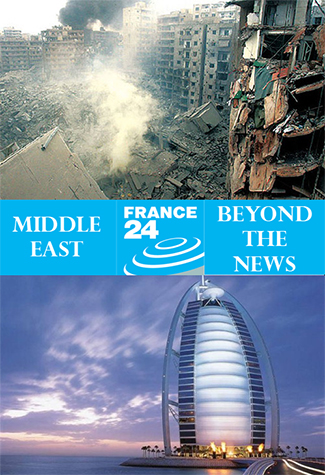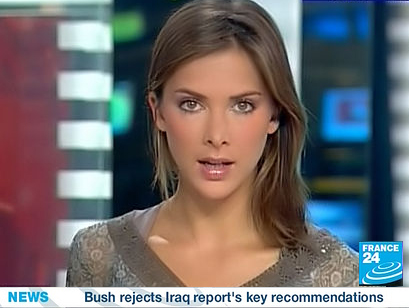France 24’s launch has drawn mixed reactions from the blogosphere.
On balance, a majority of those who blogged on the subject held a mildly skeptical view of the new network. Although most bloggers found something positive about the new network and remained hopeful that it will improve, a vocal minority looked at France 24 unfavourably. Let’s take a look at a representative sample of blog posts…
__________
In a typical expression of guarded optimism, Charles Bremer– Paris corespondent for the Times of London blogs the following in a post entitled “Now Watch The World A La Franàçaise“.
“Looking at France 24, the first impression confirms that it is a noble effort by serious and very enthusiastic journalists.”
He aggrees that the network’s French flavour was a welcome anecdote to the “Anglo-Saxon” biases of CNN and the BBC. He adds, however, a commonly heard worry:
“I wonder if the service — state funded but editorially independent, like the BBC — may not turn out to be technically unwieldy and a bit of a hybrid. For a start, the technical challenge is immense, especially on the modest 85 million euro budget.”
More specifically he mentions the almost universally panned feature of the new network:
In English, there are too many annoying voice-over translations and French journalists performing in imperfect English.
Bremer discusses the question of editorial independence, concluding that we will only know if France 24 is truly independent when after it has been tested, that is to say the next time something extremely embarrassing to the French government happens.
Bremer closes with high praise for France 24’s decision to stream live over the Internet, lauding that France 24 is now the first Western news channel available in China.
__________
A post on the blog Cyril’s Press Pass called “First Impressions of France 24” had a decidedly more mixed review. In its entirety:
I like:
* the presentation, clear with big titles and large squares
* good integration of video
* separation of sections is very clear
* easy to switch from French to English to Arabic
* great debates of important personalities
I don’t like:
* long loading time (especially for the live broadcast)
* dispatch titles are cut off
* you can’t see other users’ first impressions
* blogs are not visible enough
* the ad seems out of place
* search function doesn’t work well
* the customization did not work and is limited
__________
A more critical tone was taken on Duck News Network:
And our first impression?
“Oh.”
That’s it. “Oh.”
The post continues, criticizing the network’s lack of originality:
The channel promises to deliver “a fresh perspective on news”, but, frankly, it doesn’t. Not on the first day, anyway. It is, sadly much the same as all the other channels with which it aims to compete. Only not quite as good.
It concludes:
Our original warning that France 24 will become a minority business channel in hotel rooms still stands. Things can only get better.
__________
James Cridland in his “A News Channel Without a Certain Je Ne Sais Quoi, and One With” draws a harshly articulated, but commonly-heard unfavourable comparison with France 24’s recently launched competitor Al Jazeera English:
Tremendously unappealing programming; done without any panache or joie de vivre. Technical problems abounded, but so did simple boredom. Really not impressed…
…One channel that is surprisingly excellent is Al Jazeera. An outstandingly professional channel, with a very different outlook on world news.
__________
Simon Dickson, a new media consultant in the UK offers his opnion in a post entitled France 24: A Poor Start.
Dickson takes issue with the overdubbing, and concludes with the dreaded comparison:
Frankly, it looks amateur – rolling news done on the cheap. And when it’s a single press of the remote control away from the uber-slick Al Jazeera English, it looks even worse.
__________
Respected British journalism professor, and former TV presenter Adrian Monck adds in his post “France 24- Fromage… Dommage!” another comparison:
side from the pretty dreadful Google translate issues, France 24‘s Anglo version is basically Euronews with cheap anchors and cheap sets interspersed with overly repeated, over-long segments.
Adding more specific critiques:
The circular debate set is cold and everyone’s too far apart. Remote guests are cut in horribly. The framing stinks. The audio sucks. It’s a tough watch.
__________
Liberty Scott, a curiously Republican-sounding Kiwi took a broader view and attacked the very viability of a government subsidised news network:
However, the French government, ever looking for a way to prove how utterly unresponsive government is to what people actually are willing to pay for, has funded and launched France 24, a global TV news channel in French and English. The concern has been that the other channels reflect an Anglo-Saxon view of the world. Well, had the French government not taxed and regulated its own broadcasters into submission, this could have happened spontaneously, but France and entrepreneurial flair are words that don’t go together often.
__________
And finally Gareth Cartman’s “An Evening With France 24” takes an unusual look at France 24, liveblogging its launch minute-by-minute. Some highlights:
8:43 – The first news broadcast seemed to go off without a hitch apart from the odd nervous stumble and “errr” from the reporter in Lebanon
8:44 – Ooh look, the first advert is for a Citroen. Yeah, that’s French. I’m relieved now.
8:48 – Dominique’s blathering on about the French viewpoint being “insolent and cheeky”. Love it. You go, Dom.
9:15 – I didn’t know Javier Solano’s English was so… average. “My own wind took me here”, he says.
9:30 – Well, Iraq is still the headline news on both channels. And I’m off to do something other than watch the news. Conclusions? Well, it’s yet another news channel and the headlines seem to be the same as CNN or BBC World, but it’s almost refreshing – maybe it’s all those light blue graphics or Andrea Sanke’s charming little slip-ups – but I quite like it. Obviously, it’s early days and we haven’t seen any of the programming for real yet, and the bombast from politicians like Dominique de Villepin is a bit painful but if it means we don’t have the war-mongering of CNN to put up with in hotel rooms, then it can only be a good thing. Allez France24.
__________
Summary: The blogosphere is largely skeptical on France 24 so far, with those sympathetic to the project tempered by early shortcomings.
Among the most common complaints are:
- The programs done entirely in voiceovers on the English channel.
- Over-repetition of segments.
- Overall technical inferiority to the competition. (graphics, audio, etc.)
Although I agree with many of the critiques I’m still bullish on the network’s prospects, if for no other reason than the strong demand for a less American voice in global news.
I ‘ll be adding my own review of France 24’s launch soon.
Stay tuned, and let your own voice be heard.
Add your reactions to France 24 in the comments! : )



 Posted by saveoregon
Posted by saveoregon 








